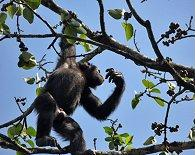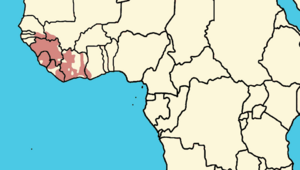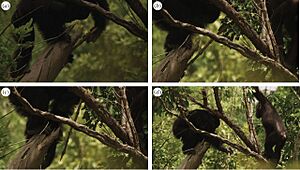Western chimpanzee facts for kids
Quick facts for kids Western chimpanzee |
|
|---|---|
 |
|
| Conservation status | |
| Scientific classification |
|
| Kingdom: | Animalia |
| Phylum: | Chordata |
| Class: | Mammalia |
| Order: | Primates |
| Suborder: | Haplorhini |
| Infraorder: | Simiiformes |
| Family: | Hominidae |
| Subfamily: | Homininae |
| Tribe: | Hominini |
| Genus: | Pan |
| Species: | |
| Subspecies: |
P. t. verus
|
| Trinomial name | |
| Pan troglodytes verus Schwarz, 1934
|
|
 |
|
The western chimpanzee is also called the West African chimpanzee. Its scientific name is Pan troglodytes verus. This amazing animal is a type of common chimpanzee. It is currently listed as Critically Endangered, which means it's in great danger of disappearing.
Western chimpanzees live in West Africa. You can find them in countries like Côte d'Ivoire, Guinea, Liberia, Mali, Senegal, Ghana, and Guinea-Bissau. Sadly, they used to live in Benin, Burkina Faso, and Togo, but they are no longer found there.
Contents
What's in a Name?
The name Pan comes from Greek mythology. Pan was a Greek god of fields and forests.
The word troglodytes is Greek for 'cave-dweller'. A scientist named Johann Friedrich Blumenbach gave this name to chimpanzees in 1779.
The word verus is Latin for 'true'. This part of the name was added in 1934 by Ernst Schwarz.
Chimpanzee Family Tree
The western chimpanzee (P. t. verus) is one of four types, or subspecies, of the common chimpanzee (Pan troglodytes).
The other types are the central chimpanzee (P. t. troglodytes), the Nigeria-Cameroon chimpanzee (P. t. ellioti), and the eastern chimpanzee (P. t. schweinfurthii).
Western chimpanzees are the most unique genetically among all chimpanzee subspecies. This means their genes are a bit different from the others.
Where Western Chimpanzees Live
Western chimpanzees once lived across a huge area. This stretched from southern Senegal all the way to the Niger River.
Today, most of them live in Guinea, Sierra Leone, and Liberia. Their homes are often forests and woodlands.
How Western Chimpanzees Behave
Western chimpanzees have many interesting behaviors. Some of these are unique and not seen in other chimpanzee groups.
What Western Chimpanzees Eat
Male and female western chimpanzees sometimes hunt different animals. In one area called Fongoli, Senegal, females mostly hunt Senegal bushbabies. Males also hunt bushbabies, but they hunt more monkeys.
Males often hunt green monkeys and Guinea baboons. Only males have been seen hunting patas monkeys. Only females have been seen hunting banded mongooses.
Both male and female chimpanzees will hunt young bushbucks if they get the chance.
Chimpanzees Using Tools
Chimpanzees of all ages use tools to hunt. Females, both adults and young, are a bit more likely to use tools than males.
Chimpanzees near Kédougou, Senegal, have been seen making spears. They break straight branches off trees. Then, they strip off the bark and small branches. They sharpen one end with their teeth.
They use these spears to hunt small animals called galagos. These galagos often sleep inside hollow tree branches.
Special Behaviors of Western Chimpanzees
Western chimpanzees do some amazing things that other chimpanzee types don't. Some scientists even think they might be a separate species because their behavior is so different.
They make wooden spears to hunt other primates. They also use caves as homes, which is very rare for chimpanzees.
These chimpanzees share plant foods with each other. They also travel and look for food during the night. They even go into water and play to stay cool when it's very hot.
Female western chimpanzees are very social. They often help each other when they have problems with males. This means their groups have a more balanced power structure between males and females.
Female western chimpanzees also hunt and go on patrols with males to protect their area. They play a more important role in their group's life than females in other chimpanzee groups.
Usually, only female chimpanzees move to new groups, and males stay in their birth group. But western chimpanzees are different. Both males and females can move between groups. This shows that males might be less protective of their territory.
Males often have babies with females from different groups. There have even been cases of male western chimpanzees living alone. This is very unusual, as chimpanzees usually cannot survive by themselves.
Male western chimpanzees are generally respectful of females. They do not usually take food from females by force. This might be because the females often form strong alliances.
In some groups, like the Tai forest community, unrelated adults adopt baby chimpanzees. Both male and female adults adopt babies equally. Female western chimpanzees can also refuse unwanted advances from males. They can choose who they want to have babies with. This shows how active and important females are in their communities.
Why Western Chimpanzees Need Our Help
The western chimpanzee is listed as Critically Endangered by the IUCN. This means they are at very high risk of becoming extinct.
There are about 21,300 to 55,600 western chimpanzees left in the wild.
The biggest danger to western chimpanzees is habitat loss. This happens when their forest homes are cut down or destroyed. They are also hunted for bushmeat, which means their meat is eaten.
See also
 In Spanish: Chimpancé occidental para niños
In Spanish: Chimpancé occidental para niños
 | Sharif Bey |
 | Hale Woodruff |
 | Richmond Barthé |
 | Purvis Young |



